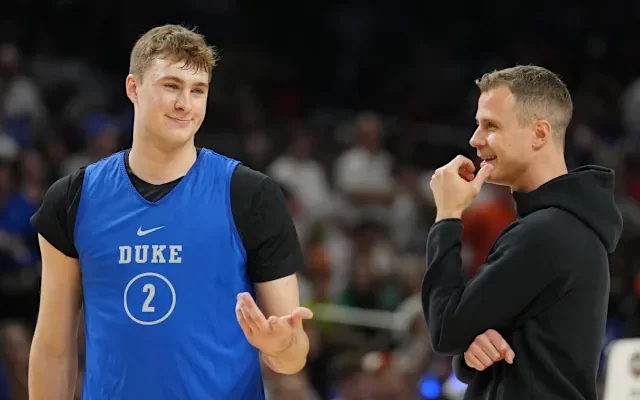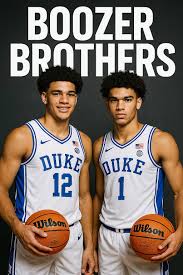Jon Scheyer Makes History at Duke: Secures Third Top-Ranked Recruiting Class in Just Four Years, Cementing His Status as a Recruiting Powerhouse
When Jon Scheyer was named the successor to Mike Krzyzewski at Duke University, many wondered whether the former Blue Devils guard and associate head coach would be able to fill the colossal shoes left by a legend. Coach K’s tenure defined an era in college basketball, producing national championships, NBA stars, and a culture of excellence that few programs could rival. The transition to Scheyer marked a new chapter, and though expectations were high, there were skeptics. Fast forward four years into his tenure, and Scheyer has silenced those doubts in resounding fashion. With the recent announcement that Duke has landed the No. 1 ranked recruiting class for the third time in four years, Scheyer has not only validated his appointment but firmly established himself as a powerhouse in the college basketball recruiting landscape.
The ability to attract elite talent year after year is one of the most critical aspects of maintaining a top-tier basketball program. It’s an area where legendary coaches like Krzyzewski, Roy Williams, and John Calipari have long excelled. Now, Jon Scheyer is beginning to carve out his own legacy in this sphere. Duke’s 2025 recruiting class features an exceptional mix of high-ceiling prospects, headlined by players already projected to be one-and-done NBA lottery picks. These commitments underscore not only Scheyer’s ability to identify talent but also his skill in building genuine relationships with recruits and their families—a cornerstone of successful recruiting in the modern era.
Scheyer’s success on the recruiting trail cannot be attributed to inertia or simply riding the coattails of Coach K’s legacy. While that legacy undoubtedly opens doors, maintaining momentum—and doing so at such a high level—requires a unique blend of charisma, strategic vision, and relentless work ethic. Scheyer’s pitch to players has consistently emphasized player development, preparation for the NBA, and participation in a winning culture. But more than that, he’s offered something distinctive: a promise of empowerment. Scheyer makes it clear that Duke players will not just fill roles—they’ll help shape the team’s identity and style of play. It’s an appealing message to top-tier high school talent, many of whom aspire to immediate impact and accelerated growth.
One of the standout aspects of Scheyer’s recruiting approach is his adaptability. In an era defined by rapid change—whether through the transfer portal, NIL (Name, Image, and Likeness) opportunities, or shifting conference dynamics—Scheyer has proven himself agile and forward-thinking. He recognizes the importance of aligning Duke’s historic brand with modern trends, ensuring the program remains not just competitive, but elite. By embracing NIL, for example, Scheyer has helped create an environment where players can thrive both on and off the court. Prospects see Duke not only as a stepping stone to the NBA but also as a platform to build their personal brands.
The consistency with which Duke is landing top-ranked classes speaks to more than just talent accumulation—it signals sustained institutional excellence. Scheyer has re-energized the Duke basketball machine, bringing in players who are versatile, coachable, and committed to team success. He’s also surrounded himself with a coaching staff that complements his strengths, featuring assistants with both NBA and college experience, who contribute to player development and game preparation. This team effort has created an environment where five-star recruits don’t just come to play—they come to get better.
In an increasingly competitive recruiting landscape, where programs like Kentucky, Kansas, and Alabama are pouring immense resources into talent acquisition, Duke’s dominance under Scheyer is all the more impressive. Consider this: in the last four years, Duke has brought in three top-ranked classes. That level of consistency not only places Scheyer in rare company but also sends a clear message to prospective recruits—Duke is still the epicenter of college basketball excellence. This consistency helps fuel a self-reinforcing cycle: the best want to play with the best. When elite prospects see other elite talents committing to Duke, they are more likely to follow, creating a virtuous circle of recruiting dominance.
What makes this particular achievement even more significant is the broader context in which it has occurred. Scheyer’s first season as head coach came on the heels of a generational transition. The retirement of Coach K wasn’t just a loss for Duke—it was a seismic shift for the entire sport. There was widespread speculation that Duke’s gravitational pull on recruits might weaken. Instead, the opposite has occurred. Not only has Scheyer maintained the program’s prominence, but he’s expanded its reach, building relationships with top talent from across the country and even internationally. His 2025 class includes a dynamic mix of shooting guards, stretch forwards, and defensive specialists, each bringing a specific skill set that fits into Scheyer’s fast-paced, versatile system.
It’s also worth noting how Scheyer’s success has come without sacrificing Duke’s traditional standards. The program continues to place a high value on academics, character, and cultural fit. This careful balancing act—bringing in high-end athletes while maintaining the integrity of Duke’s storied program—reflects Scheyer’s holistic approach to coaching and leadership. He’s not merely chasing stars; he’s building a roster that can win games, elevate Duke’s national profile, and represent the university with distinction.
Beyond the court, Scheyer has shown a keen awareness of how to navigate the broader ecosystem of college basketball. He maintains strong ties with grassroots programs, AAU coaches, and high school mentors, all of whom play pivotal roles in shaping a recruit’s journey. These relationships are built on trust and transparency—qualities that have endeared Scheyer to the basketball community at large. Recruits and their families often speak highly of Scheyer’s honesty, his willingness to invest time in their development, and his vision for how they will fit into Duke’s future. This level of engagement is not performative; it’s foundational to Scheyer’s success.
Perhaps most impressively, Scheyer has accomplished all of this while still growing as a head coach. He has shown poise under pressure, tactical intelligence on game days, and a willingness to evolve. The transition from recruiter to in-game strategist is not always seamless, but Scheyer has demonstrated that he can manage both roles with confidence. His teams play with intensity and purpose, and they reflect his commitment to preparation, adaptability, and high-level execution. These attributes further enhance his appeal to top recruits, who want to play for a coach who not only believes in their talent but knows how to maximize it.
As Duke looks ahead to future seasons, the implications of Scheyer’s recruiting success are profound. With a stockpile of elite talent on the way, the Blue Devils are positioned to be national title contenders year in and year out. Depth, athleticism, and versatility will define the roster, giving Scheyer the tools to compete with—and defeat—any opponent in the country. Moreover, this pipeline of elite recruits ensures that Duke will continue to be a marquee destination for NBA scouts and general managers. Playing at Cameron Indoor Stadium remains one of college basketball’s most prestigious opportunities, and Scheyer’s leadership has only strengthened that reputation.
In the long view, Scheyer’s recruiting dominance may eventually redefine what sustained success looks like in the post-Krzyzewski era. Few coaches in history have stepped into a job with such high expectations—and even fewer have surpassed them as quickly as Scheyer has. His accomplishments are not simply about rankings or media buzz; they represent a fundamental shift in how elite programs sustain themselves over generations. Scheyer has taken the baton from a legend and not only kept pace but accelerated the program into new territory.
There is also a symbolic resonance to Scheyer’s success. As a former Duke player who helped win a national title in 2010, he represents the continuity of the program’s core values: toughness, selflessness, and excellence. That connection matters to recruits and alumni alike. It fosters a sense of loyalty and identity that goes beyond wins and losses. Scheyer’s journey—from player to assistant to head coach—embodies the Duke ethos in a way that few outsiders could replicate. His credibility with recruits is not just professional; it’s deeply personal.
With three No. 1 classes in four years, Scheyer has placed himself squarely in the elite tier of college basketball coaches. His name is now mentioned alongside recruiting giants like Calipari, Bill Self, and Nate Oats, and it’s a distinction he has earned through diligence, vision, and authenticity. The recruiting trail is as competitive as any arena in sports, and Scheyer has proven he belongs at the top.
Jon Scheyer’s latest accomplishment is more than just a feather in his cap—it’s a signal of what’s to come. Duke basketball, under his leadership, remains a standard-bearer in the sport. The foundation he’s laying today will shape the future of the program for years to come. And if the past four years are any indication, that future is in remarkably capable hands.



